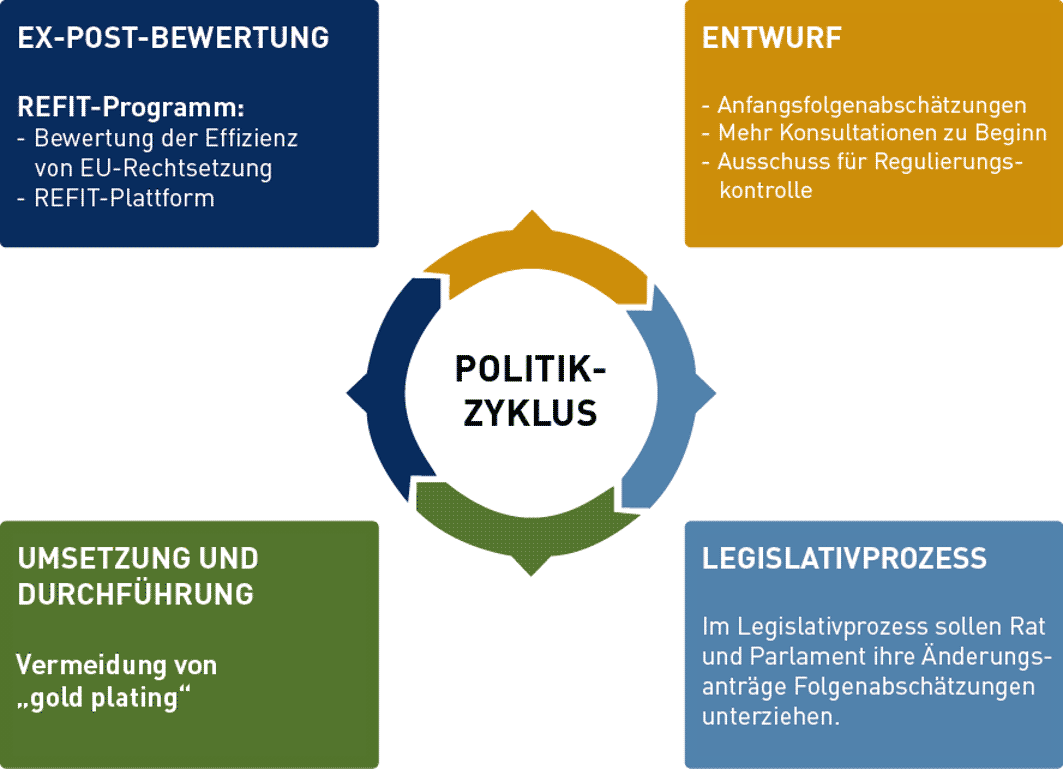Better regulation in the EU

©AdobeStock sergign
Better Regulation in the European Union aims to simplify and improve the legal framework of EU legislation. Better regulation measures consist of two components: Impact Assessment and REFIT. Impact assessment starts before legislation is adopted. REFIT, on the other hand, examines existing legislation to ensure that it is fit for the times and that it is effective. This is done by the REFIT platform, in which both representatives of national governments and the social partners participate. German employers are represented by BusinessEurope.
Against the backdrop of global competitive challenges, simple and comprehensible standardisation is an essential locational advantage. Citizens' acceptance of the EU will also be increased if it is characterised by a lean, unbureaucratic and comprehensible set of standards. In social policy, this also includes ensuring that EU legislative procedures - and trilogue negotiations in particular - become more transparent: Negotiation dates, agendas and minutes must be accessible in a timely manner.
More impact assessments by Council and EU Parliament desirable
The inter-institutional agreement on better regulation concluded between the EU Parliament, the Council and the Commission clearly acknowledges the importance of impact assessments. It pays particular attention to competitiveness, the reduction of red tape, especially in relation to small and medium-sized enterprises, and the digital dimension. It should also be emphasised that it explicitly recognises the expertise and representativeness of social partner agreements in EU legislation. The EU Commission has publicly committed itself to carrying out and does carry out impact assessments for its legislative proposals. A greater commitment by the Council and the EU Parliament to impact assessments would be desirable, also precisely because these institutions can amend legislative proposals of the EU Commission.
Establish one-in, one-out in Europe
"One in, One out" is to become part of the Better Regulation agenda. Under this agenda, transparency, sound evidence and the views of the public and stakeholders will be emphasised in the preparation and evaluation of EU legislation and policies. The agenda covers all policy areas and aims to ensure targeted legislation that goes no further than necessary and achieves the desired objectives at the lowest possible cost. The methodology of one-in, one-out is to require legislators to quantify the compliance burden of new legislation and compensate for the increase in the same amount elsewhere. In this way, the total bureaucratic burden on citizens and business does not increase. The quantification of the burden could take place within the impact assessment.
Establish independent bodies as control organs
Of great importance, especially in the case of voluntary commitments by the EU institutions, is the control of the quality of impact assessments and the suitability test of the legislation. The EU Commission has taken a step in this direction in the form of the Regulatory Scrutiny Boards. Unlike the previously existing Impact Assessment Board, the new Board is nominally independent. Some of the members are recruited from outside the EU institutions.
"Goldplating": introduce "comply or explain" mechanism
Gold plating describes the "saddling on" of additional national requirements not required by European regulation when EU Member States transpose European standards into national law. As this can lead to an undermining of the level playing field in the internal market, there is a need for action here. An obligation should be introduced to declare over-fulfilment of EU requirements to the EU Commission ("comply or explain"). This will promote a uniform regulatory framework in a common internal market.
Initiatives of the BDA
- Representation of the interests of German industry at the European employers' association BUSINESSEUROPE - also in the "Better Regulation" working group
- Proposals for simplification in the REFIT platform
Transparency and involvement of stakeholders at all stages of the policy cycle
Better regulation must be ensured throughout the life cycle of a legal act. This is a horizontal task to which all EU institutions must contribute. Transparency and stakeholder involvement should be ensured at all stages of the legislative process. Impact assessments and evaluations are not a substitute for policy decisions. Rather, they provide a comprehensive and evidence-based basis for policy decisions.
A holistic approach in the context of better regulation
Cycle of the legislative process

©BDA | The Employers







